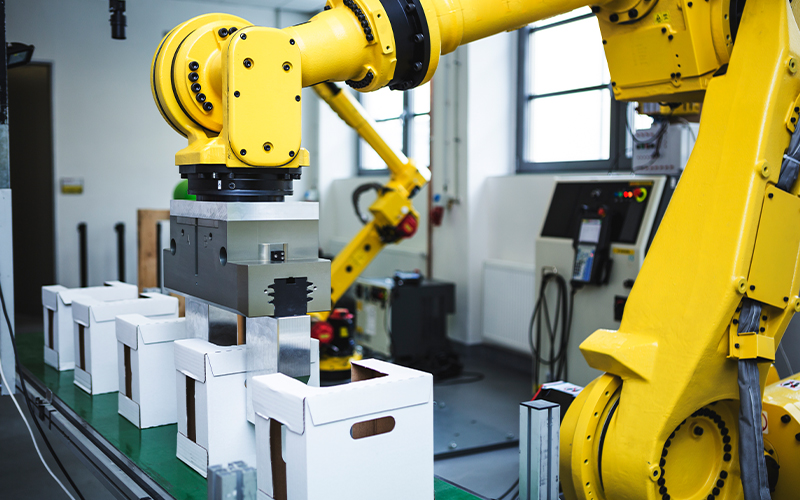BUSINESS TRANSFORMATION
Automation : The key to the future of Healthcare operations
The COVID-19 pandemic has disrupted the way in which organisations function, the healthcare sector being one of the worst hit. There was a sudden rise in the demand for doctors, hospitals, and services of healthcare professionals worldwide during the pandemic. The healthcare sector was found lacking to address this explosive demand. The lacunae of the healthcare sector came to the forefront. The healthcare industry faces the challenge of providing quality treatment quickly. This is a daunting task because the healthcare sector is overburdened by skyrocketing costs, large volumes of data management, and stringent regulations. In such a scenario, technology seems to be the only saviour.
Several industries have realised the significance of technological intervention and started their journey of digital transformation. However, the healthcare sector was slow to adopt digitalisation. But the pandemic has left this sector with no option but to adopt digital transformation. The pandemic has brought forth an increase in virtual consultations. An analysis by Deloitte reveals that virtual consultations increased from 0.1% to 43.5% during this period.
Why Intelligent Automation is the Way Ahead for the Healthcare Sector?
Healthcare has a complex framework with a network of different healthcare professionals, processes, patients, and more. This sector needs to handle large volumes of data in the form of patient case histories, data for managing insurance processing, patient records, and more.
The supply chain in a hospital starts when a patient visits the doctor, the diagnosis of his condition, tests performed, treatment provided, procurement of medicines, revisits, and need for advanced treatments. In addition to this, the hospital needs to procure equipment, etc. for testing and treatment of patients.
There are many processes that need to function in tandem so that hospitals can provide the best treatment to patients. Traditional methods of functioning are time-consuming and prone to errors. Unfortunately, even a minor error in this field can have severe repercussions.
In recent years, the demands of patients have increased. They want transparency in the service provided by the hospital and are more aware of their rights. Besides, they are not ready to make allowances for the delays that are a part of the legacy system. In a nutshell, they want a better patient experience.
Business automation takes care of most of these pain points in the healthcare sector. Several repetitive processes can be automated using technologies like Robotic Process Automation(RPA). RPA bots can be programmed to perform all tasks that follow a logical sequence.
Some of the processes that can be automated by RPA bots include:
- Patient onboarding and follow-ups
- Medical billing
- Claims processing
- Generating reports for doctors
- Prescription management
- Infection management, and more
RPA eliminates human errors and speeds up the process. It reduces costs and enhances efficiency and patient experience. This also means that the hospital staff that was working on these mundane tasks is now available for other skilled roles in the hospital.
Hospitals need to maintain large volumes of data that need to be updated over time. Doctors need data to make critical decisions. Intelligent software can extract data stored in the form of images, clinical research trials, medical claims, and more. AI can analyse both structured and unstructured data. It can identify patterns and provide valuable insights to healthcare professionals. Also, AI can diagnose diseases at a much higher speed than a medical doctor.
Electronic health records help maintain the patient’s history including allergies, etc. These records are maintained over the cloud. They can be accessed by other relevant entities such as pathologists, diagnostic labs, pharmacies, etc. This streamlines the entire process. The doctor can easily access the patient’s data including various diagnostic reports. The pharmacy has the information regarding the medication readily available thereby speeding up the process of dispensing medicines. Electronic health records streamline the process and minimise the margin for error.
IoT is another technology that is impacting the healthcare sector. Embedded devices to monitor parameters such as heart rate, stress levels, and detect blood oxygen levels, enable healthcare professionals to monitor these vital aspects in an agile* manner. It helps provide preventive care in addition to helping arrive at an accurate diagnosis.
In Conclusion
The future trends in the healthcare industry will depend largely on the extent to which they leverage business automation and other emerging technologies. Implementing different technologies will pave the way for man-machine collaboration. A collaborative approach will enhance the efficacy of the healthcare system and enhance patient experience.
*For organizations on the digital transformation journey, agility is key in responding to a rapidly changing technology and business landscape. Now more than ever, it is crucial to deliver and exceed on organizational expectations with a robust digital mindset backed by innovation. Enabling businesses to sense, learn, respond, and evolve like a living organism, will be imperative for business excellence going forward. A comprehensive, yet modular suite of services is doing exactly that. Equipping organizations with intuitive decision-making automatically at scale, actionable insights based on real-time solutions, anytime/anywhere experience, and in-depth data visibility across functions leading to hyper-productivity, Live Enterprise is building connected organizations that are innovating collaboratively for the future.






